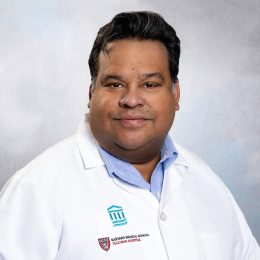
Senior Investigator
Brigham and Women’s Hospital
Andy Bhattacharjee, PhD joined the Department of Pediatrics
faculty in 2023 to help lead an initiative on the development of an in-house
clinical perinatal genomics laboratory services that will aim to remove arriers
for both OB/MFM and Neonatology physicians to utilize genomic diagnostic
testing on appropriate patients, at low cost and with rapid turn around time,
and to act as a resource to both our clinical and research faculty as they
learn to integrate genomic information into precision neonatal care.
Dr. Bhattacharjee obtained a Master’s degree in Genetics at
University of Saskatchewan and a PhD in Molecular Biology at the University of
Minnesota. He previously trained at Harvard as a post-doctoral fellow in the
Pathology Department at DFCI and the Whitehead Institute at MIT. Dr.
Bhattacharjee joined BWH after spending 20 years in industry. He worked to
develop targeted Next Generation Sequencing and Exome Sequencing at Agilent,
and then set up three CLIA certified clinical Next Generation equencing
laboratories focused on genomic sequencing of newborns : as the founder and CEO
of Parabase Genomics, the Executive Vice President of Lab services at Babies,
Inc. and the Executive and Laboratory Director of NCMG/Neuberg Diagnostics.
Most recently, he was Vice President of Healthcare Genomics at Fabric Genomics,
a company that has developed AI software for rapid interpretation of clinical
genome sequences. Dr. Bhattacharjee has been a passionate innovator in bringing
genomic information to the care of newborns by paving the way for NGS to be
performed from Dried Blood Spots (DBS), a newborn screening collection standard.
He has collaborated with Director of Newborn Genomics Dr. Richard Parad on
multiple publications over the past 14 years, and together they are working to
build the infrastructure to make genomic testing available and accessible in
the electronic medical record, and to help teach our clinical and trainee staff
how and when to best use this information.

Senior Investigator
Brigham and Women’s Hospital
Andy Bhattacharjee, PhD joined the Department of Pediatrics
faculty in 2023 to help lead an initiative on the development of an in-house
clinical perinatal genomics laboratory services that will aim to remove arriers
for both OB/MFM and Neonatology physicians to utilize genomic diagnostic
testing on appropriate patients, at low cost and with rapid turn around time,
and to act as a resource to both our clinical and research faculty as they
learn to integrate genomic information into precision neonatal care.
Dr. Bhattacharjee obtained a Master’s degree in Genetics at
University of Saskatchewan and a PhD in Molecular Biology at the University of
Minnesota. He previously trained at Harvard as a post-doctoral fellow in the
Pathology Department at DFCI and the Whitehead Institute at MIT. Dr.
Bhattacharjee joined BWH after spending 20 years in industry. He worked to
develop targeted Next Generation Sequencing and Exome Sequencing at Agilent,
and then set up three CLIA certified clinical Next Generation equencing
laboratories focused on genomic sequencing of newborns : as the founder and CEO
of Parabase Genomics, the Executive Vice President of Lab services at Babies,
Inc. and the Executive and Laboratory Director of NCMG/Neuberg Diagnostics.
Most recently, he was Vice President of Healthcare Genomics at Fabric Genomics,
a company that has developed AI software for rapid interpretation of clinical
genome sequences. Dr. Bhattacharjee has been a passionate innovator in bringing
genomic information to the care of newborns by paving the way for NGS to be
performed from Dried Blood Spots (DBS), a newborn screening collection standard.
He has collaborated with Director of Newborn Genomics Dr. Richard Parad on
multiple publications over the past 14 years, and together they are working to
build the infrastructure to make genomic testing available and accessible in
the electronic medical record, and to help teach our clinical and trainee staff
how and when to best use this information.